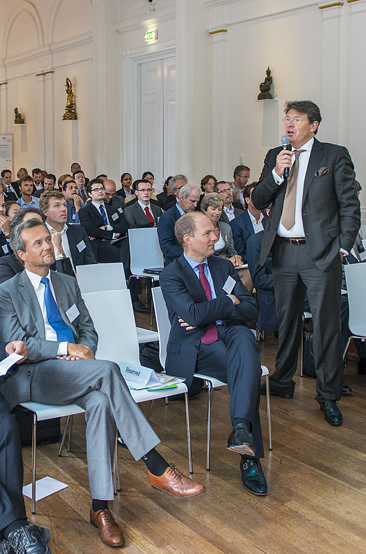Focus on the right investments
From his expert position as Non-Executive Director at the UK government’s HM Revenue & Customs tax department, and a non-executive director at Elexon Ltd, which plays a role at the heart of the wholesale electricity market, Volker Beckers gave a brisk run-through of the situation in the UK. He also has the benefit of his time as former CEO of UK-based RWE npower, a UK gas and electricity supplier.
The UK Government’s three objectives for energy policy are security of supply, affordability, and climate change. Although these are similar to other industrialised countries with an aging infrastructure, the scale is different, requiring investment of more than GBP 200 billion until 2020. So the UK Government’s proposals to compete for capital in energy infrastructure and attract more investments consist of different elements, such as capacity payments, carbon price support and so-called ‘contract for differences’. The proposition for investors appears attractive and this could be an appealing blueprint for other countries but, as usual, the devil on any element of this reform is in the detail.
Pan-European policy
 “In the UK, we clearly need a stable and predictable framework to change our behaviour,” said Volker Beckers. “Whatever technology we’re going into, it’s different to the one we have today. How do we make sure we have the right incentive between demand response and supplier response?” Beckers said the energy industry is looking at the wrong incentives for changing behaviour and channelling investments in the right direction. He suggests introducing a capacity market, in which governments should listen and respond to the capacity needed.
“In the UK, we clearly need a stable and predictable framework to change our behaviour,” said Volker Beckers. “Whatever technology we’re going into, it’s different to the one we have today. How do we make sure we have the right incentive between demand response and supplier response?” Beckers said the energy industry is looking at the wrong incentives for changing behaviour and channelling investments in the right direction. He suggests introducing a capacity market, in which governments should listen and respond to the capacity needed.
With a staggering set of statistics, Beckers proved his point about the monetary challenge of customer changes, prices, and competitive markets. So what should governments do? "We are heading towards a regulated market, and what's necessary is a pan-European energy policy," said Beckers. “But do we need a European approach? Is there a political bullishness to do so?”
Beckers said that investment cycles in the energy sector are at least 20 years, while the average life cycle of a politician is five years. “When politicians want to fix things in one go, then they’ve got it wrong,” he said.
Currently, money isn’t allocated in the most efficient way, according to Beckers. "If money is tight, we should focus on the right investments," he said, adding that it’s difficult to encourage investors to bring more liquidity to the country as they often simply can’t afford the investments. But Beckers said “it’s not just about saving money. At the end of the day, it’s about the costs we save in the system.”
Lack of large projects
Beckers brought up a serious question: “What has the energy system done for us?” Since the discussion on Electricity Market Reform, not a single large project has been brought forward. People are sceptical what it means to be subject to capacity markets.
Beckers referred to the 60 per cent reduction in CO2 emissions that can be achieved without losing comfort, but said decarbonisation can't happen with the technology installed today.
Smart meters are incompatible with the capacity markets, said Beckers. Smart meters are designed is to change behaviour, and there is no such thing as free energy; ‘There’s always someone running a business wanting to make a return’ he said. But if smart meters are affordable and reduce energy bills significantly, then there is an incentive to change behaviour. Beckers said for those in fuel poverty – those who spend 10 per cent or more of their disposable income on energy – it’s an incentive to watch energy usage. "Whatever you change, do it incrementally," he said, and concluded: "We need to reward energy-generating households."

